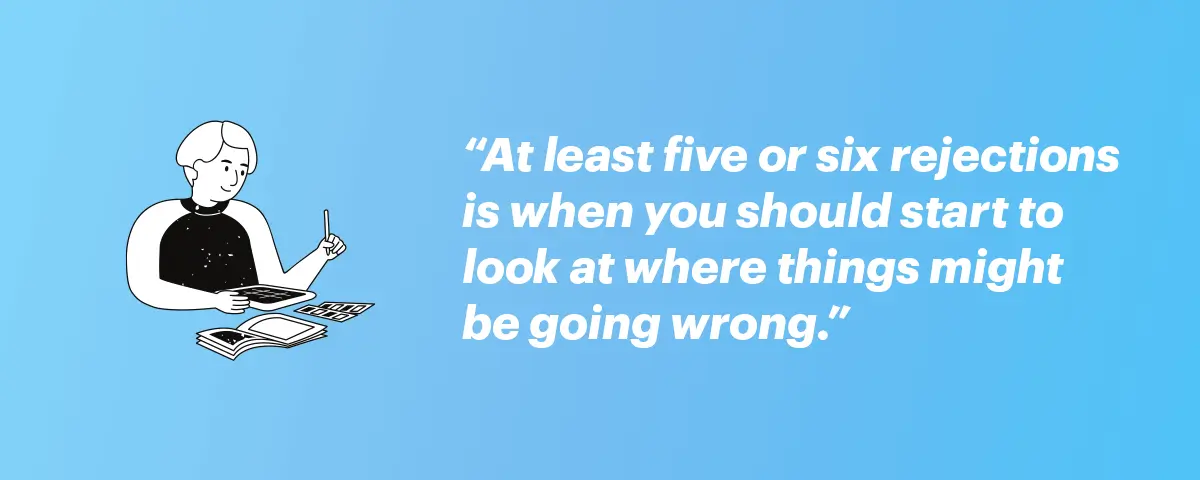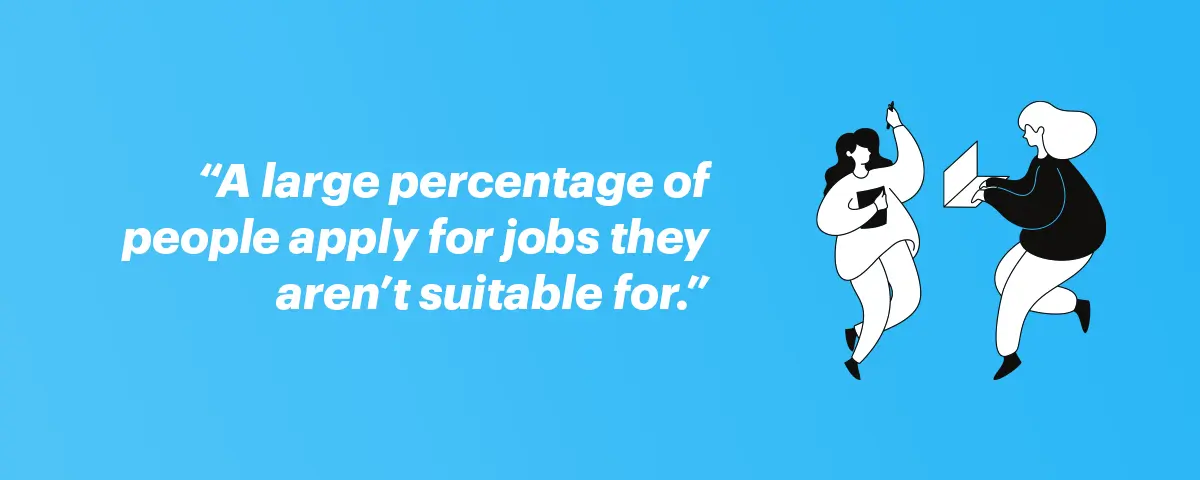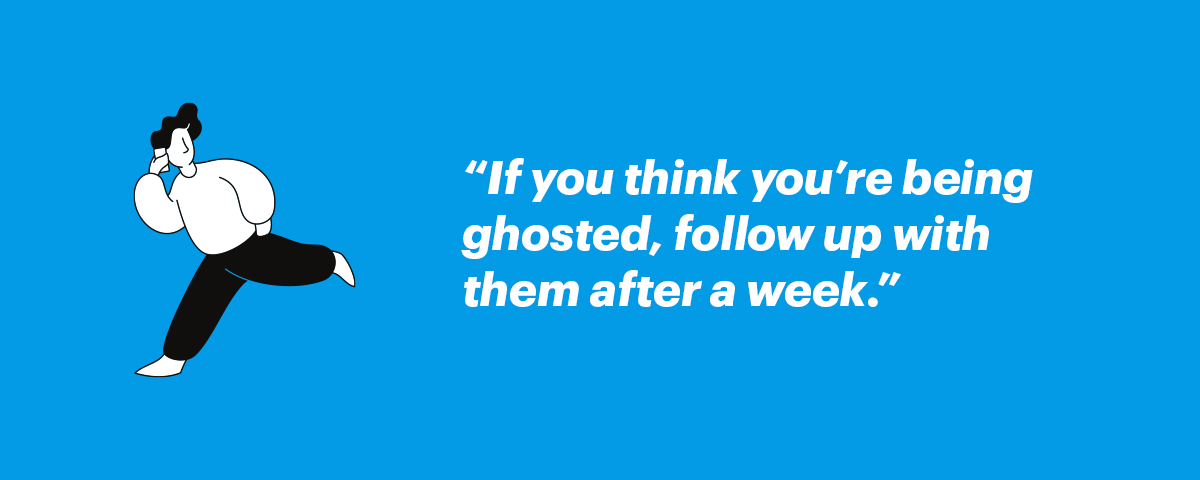Imagine you could get solid job search advice directly from someone with experience in recruiting and HR. Wouldn't that be helpful? Now you can do just that thanks to our new interview series Recruiter Reveals! Every month I interview our resident HR expert Christy Morgan on various job search topics — be it resumes, cover letters, job interviews, or anything marginally career related. |
"We appreciate your interest but —"
I know, it sucks. But it happened to all of us.
First, it's not always your fault. And you definitely shouldn't freak out after your first few rejections.
Second, even if it was your fault, there are several ways how to improve and turn the tide in your favor.
Whether it's a job application rejection or a rejection after your first or even third-round of interviews, we're going to explain what might be the reasons behind it — and how to prevent it from happening in the future.
In this interview, you'll find out:
- What might be the reasons behind your rejections;
- Why sometimes it's not your fault at all;
- How many rejections it takes to tell that you're doing something wrong;
- When to ask for feedback;
- What you can improve on your side;
- What to do after you were ghosted;
- How to make the most out of your rejection;
- Why you should send a thank-you email even if you didn't get the job.
Let's start with unsuccessful job applications. What if I've already applied for a job, how long should I wait for a reply?
I would say normally a week. Then follow up with a quick message if you haven't heard back.
Do HR managers contact only potential candidates and don't reply to others or how does it usually work?
It depends on the company. In theory, they should contact all the people who are unsuccessful either by email or automated message via their ATS and let them know. But in reality, many only contact the candidates they're interested in due to the sheer number of applications.
Is that why you should always follow up?
Yes. I don't see any harm in it. They can always say, “We're still reviewing applications” or “Sorry, you've been unsuccessful”. I think that in general if they don't get back to you in more than one or two weeks, you probably haven’t been successful because no company will let a good candidate go. But it's still courtesy to let you know. So there's no harm in following up and asking them.
Is it better to follow up via email or give them a call?
In general, the best is to send an email because you have written evidence that you've tried to contact them, or the email can be forwarded on to the person handling the screening process. But if it's a small company, sometimes picking up the phone is the best way to go.
Do you also have any suggestions on how to best formulate the follow up email without sounding too pushy?
Something along the lines of “Dear X, I'm just quickly checking to see if there's any progress on the XYZ job? I'm still very interested in being considered. Thank you very much for your time.”
How many of these job application rejections are normal? And how do I know if I'm doing something wrong?
This is a good question. I think you'll get a feeling after a while. Definitely don't freak out after your first rejection. I have a client who got rejected with his first job application and he was like “Oh it's a disaster. It must be the resume!” No. I'd say at least five or six rejections is when you should start to look at where things might be going wrong. But of course, this number also depends on how many jobs you're applying for.
What might be the reasons behind these job application rejections?
I have to say the vast majority of applications that are rejected are mostly down to two things. One is in the candidate’s control, one isn't. First one is that a large percentage of people apply for jobs they aren't suitable for. They're like “I don't really meet the requirements but I'll give it a try. You never know.” But that's not how it works. Then you send 20 applications, most of which aren’t a good fit, and then you’re depressed that you're getting rejected.
The second one is something that everyone has to be aware of, and it's that a lot of jobs these days get huuuge number of applications. It could be several hundred applications, while bigger companies can get thousands for one job. So sometimes that might be the reason you're not getting any response — because they're just dealing with so many people.
While you can't control how many people are applying for the same job, you can control the types of jobs you apply for and make sure they're suitable. That should reduce the rejections.

Can you think of other reasons?
When I have clients coming to me saying it's not working, it's almost always that they're applying for jobs they're not suitable for. Or they haven't tailored their resume to show they're a good fit. Recruiters are naturally going to reject you if you don't show them you have the experience and skills they need. Or just the sheer number of applications means that even though you could be a good fit, there might be other people who are a better fit, and so they have to draw the first round line somewhere.
Can I also get rejected because of the bad design of my resume? Or only if the content is weak?
You shouldn't, unless you're a graphic designer because then your resume is showcasing your skills. But in general, no. If you have an off-putting design, it might leave a slightly negative impression, but if a company is using an ATS system, they may never see the original anyway. ATS-friendly content and relevance are more important. Same applies to your cover letter.
But if I had several job rejections, I should probably make some changes to my resume and cover letter, right?
If you're applying for jobs which are relevant and still getting rejected, then you should make some changes to your resume and cover letter and make sure they're tailored towards the job. Try to think about what's not working. Is it the types of jobs you're applying for? Is it something you're not showing, such as keywords or experience? Or is it too short or long? Is it ATS-friendly? Are you applying for jobs that are not realistic? Are they in India and you're in New Zealand? You know, looking at all these things and trying to figure out if there's a pattern there.
For example, I had a client who wasn't getting any interviews so I took a look at his resume and could see he was taking a lot of relevant detail out. He said he didn't want to bore recruiters with detailed info in his resume, and that he can just tell them everything during the interview. But you have to tell them first. They have to understand why you’re a great fit to interview you in the first place.
Maybe he didn't want to look overqualified. Can you get rejected also because of that?
Yes, it can happen and this is an interesting one. There are recruiters out there who are afraid of people who are "overqualified". They can do the job and bring a lot of value to the company, but there is this fear that the person is going to get bored and leave. It's kind of a strange mentality in one sense, because a lot of factors contribute to retention, such as being offered in-house opportunities for career growth and development.
But on the other hand, people sometimes apply for jobs they're really overqualified for, which can be too much of a step back. For example, when you apply for an Administrator job but you're an Operations Manager. At times, many of us want a change of scenery, or to focus on family life rather than career progression. That’s totally OK. But, unless you explain that in your cover letter, you risk being rejected immediately.
So it again comes down to the fact that we should apply for the jobs for which we're the right fit.
In general, yes.
Does it also happen that job seekers don't follow application instructions and get rejected because of that?
Yes, that can happen too, particularly when specific instructions are given (e.g. "attach a resume only, no cover letter" or "only candidates who specify their salary expectations will be considered".) It shows you’ve read the job description and can pay attention to details. But in theory, if you're well qualified, it shouldn't disqualify you. But this again depends on the individual recruiter. There are some who'll say “They didn't follow the instructions, therefore they’re not suitable”, but I hope that’s rare. However, if you're getting consistent rejections from all applications, it probably doesn't have anything to do with the instructions.
In a nutshell, what would you suggest job seekers do when they're getting many job application rejections or ignores?
Look at your resume and the jobs you're applying for to see if there's a mismatch there. If you don't do resumes often and you're not quite sure, there are resources like Jobscan where you can throw in your resume and the job description and it will tell you how well optimized your resume is. It's not perfect and the percentage they give you is a little bit questionable, but it gives you very good guidance on what might be wrong and what to improve.
Also, always look at the essential requirements section, not just the fluff, because this tells you precisely what they're looking for. That's how they're going to compare your resume against the job description and other applicants. You can maybe get away with one or two essentials missing if you’re an otherwise strong fit, but if it's a higher percentage, then think again if you’d like to apply.
So, in a nutshell, apply for relevant jobs, make sure your resume is tailored, that you're using important keywords, and check for other specifics such as visa requirements.

Do also companies post some positions which were already filled internally?
They may post a job sometimes that they want to fill internally, but they have to post it for various reasons. There are always things like diversity and equality, especially in public sector roles. Or if they want to hire somebody that needs a visa. When I lived in Ireland, this happened to me — they had to advertise my job every year, even though I already held it.
Poor job seekers who are going to apply for these jobs!
Yes, unfortunately. Many times you don't know what's happening behind the curtains. Many times you have to get through the ATS, you don't know who's applying, then you don't know whether the position is filled already. Sometimes, job searching is like playing Russian roulette.
So in case my job application gets rejected, should I ask for feedback?
At this stage, I'd say no. Unless it's a small company. Firstly, they simply don't have the time and secondly, it's better to ask at the interview stage. But even then they may not give you any feedback. A lot of recruiters these days, particularly in the US, are very concerned about being sued for discrimination. So they tend not to give feedback at all. I don't know if that's right or wrong, but I understand both sides.
I find it a courtesy to at least let job seekers know.
Yes, it should work that way. But with the whole lawsuit culture these days, companies do get sued by people for lots of reasons. So they just want to protect themselves and I totally get that.
Ok, let's now skip to job interview rejections as such. After a job interview, how long should I wait for a company to get back to me?
I'd say the same time frame — one week. But in general, recruiters will inform you at the end of your interview what the next steps are and if they don't, there's no harm in asking them. If they don't get back to you within that time frame, add one day on the top of that and then follow up. In case you didn't discuss the next steps, you can email them after one week.
Should one also follow up via email in this case?
I would first email and if they don't respond within 2 days, give them a call. But email is good as written evidence, and particularly as it allows you to cc other people which can often get you a faster response. So, at your interview, try to remember the names so you can cc others if needed.
How many post-interview job rejections is it normal to receive on average?
It really depends on how many people are being interviewed. I mean, the likelihood of you getting a job is not like a hundred percent even if you are interviewed. But the odds of success are higher compared to when you first sent in your application.
But when should I, as a job seeker, realize that I'm doing something wrong?
I think after 5 or 6 rejections. Unless you're in a really competitive field where it's very hard. Even if they don't give you any feedback, you probably can get a feeling if there's something wrong on your side.
What might be the reasons why I can't get a job?
Mostly because there's just someone who's a better fit than you. Culture fit plays an important part. It could be that none of the candidates are suitable so everybody gets rejected. But usually it's that your experience is not as strong as somebody else's. And that's not a bad thing. The fact that you were interviewed means that you’re going in the right direction.
Maybe also because of poor interview skills?
Yes, definitely. If you aren't expressing yourself very well, or you're awkward or if you seem like a person that would be difficult to work with, and so on. Being nervous is one thing. Recruiters expect it, so don’t worry (recruiters are nervous sometimes, too!) But if you just can’t express yourself or come across as a poor culture fit, you have some things to work on.
I think it's connected to the job interview preparation that we've talked about earlier. When you prepare well, then you shouldn't have this problem.
Exactly. Of course, you still may get nervous, but recruiters can see that you came prepared and are trying.

What about other reasons? Maybe if your salary requirements were too high?
That's definitely something. If you're asking for too much compared to what they can offer, and won’t negotiate (of course, you don't have to). Another reason may be whether you need a visa. Or if you need to work from home a few days a week and it wasn't in the job description. Things like that. But mostly, it comes down to experience and culture fit.
What to do if I get ghosted after a job interview?
Unfortunately, it does happen. Sometimes recruiters are busy, forget, or don’t want to give bad news. So they kind of hope you'll get the message. There’s absolutely no excuse for that type of behavior, however. Thankfully, most recruiters are professional and will get back to you.
If you think you’re being ghosted, follow up with them after a week. And if you still don't get a response, at that point I'd start to think if that's the kind of company that I'd like to work for. Because how they treat you at this stage is probably how they'll treat you as an employee.
I think that job seekers often don't even want to reach out to them anymore once they get ghosted.
Yes, it's really unfortunate. The thing is, the internet enables ever-vaster numbers of people to apply for jobs, which increases the recruiter’s workload. But I think that at the interview stage when you've had that personal connection, you should let that person know. Whether it's positive or negative. Because even after a rejection, that person will have a positive impression of your company if you treat them courteously. And they're going to say positive things even if they're disappointed. If you ghost them, they'll not only not want to work for your company in future, but you'll also damage your reputation. Because they might tell 10 other people about their negative experience.
When they let me know that they picked another candidate, can I ask for feedback at this stage?
Yes, you can ask them with an explanation that you'd like to improve for your next job interviews. But bear in mind that they may not give you any because of lawsuit fears. Or maybe they loved you but somebody else in the panel didn't, so they don't want to say that to you. It's good to ask, but you may not get a response.
What can job seekers do better at the job interview stage?
If they don't give you feedback, then it's probably not your fault. If they give you feedback on what was wrong, then you can work on that. Or if there were multiple rejections, you can often see a pattern there by yourself. Maybe it's only about practicing your interview skills and coming better prepared.
And how can they build bridges instead of burning them?
Rejection isn't nice, but you can deal with it positively. So even if you get rejected, just say thank you for letting you know. Something like “Thank you for your time, I really appreciated this opportunity to learn more about your company and the job. I'd still be really interested in any roles that may be available in the future, so please bear me in mind. Thank you so much once again.”
Should you send a follow up email after every unsuccessful job application? Or only when you get rejected after a job interview?
At the beginning of the application process where you usually only get a generic rejection, it's not necessary. Once it gets to the personal connection stage, then I feel like it should be much more personal. That's when you can send a rejection follow up.
How can job seekers make the most out of the rejection?
Turning it into a positive like we've just said. Not burning any bridges is very important. If they give you any feedback, take that on board. And then if you're doing other interviews and you see a similar pattern, it's something to work on. And if nothing else, it's also good for interview practice, which is always positive.
It's also great for networking. If you've interviewed with them, connect on LinkedIn. Usually, I advise to wait until after the interview and they’ve made their decision, so it doesn't seem pushy. Then you can connect, thank them, and ask them to bear you in mind for future opportunities.
Isn't it a bit weird to connect with a recruiter on LinkedIn after I was rejected?
Not really. Because you're a potential candidate in the future anyway. If you do it after your job interview and when you already got feedback, when in theory you have nothing to gain, then it looks positive.
So can you apply for a job at the same company even though you were unsuccessful some time ago?
Sure, you can. There's no harm in it. A lot of companies even still have your resume on file for a certain time. And particularly if you interviewed there, I'd try to contact the HR person directly with something like “Hi X, I interviewed for Y job last year. I saw another fantastic opening and I'd be really interested. Should I apply online or would you accept my updated resume directly?” And see what they say. That's where having a positive relationship with that person by ending the previous interview positively comes in handy.
Key takeaways: Why you can't get a job and what to do about it
Job application rejections:
- How many rejections is too much: 5 or 6 rejections.
- Reasons: Two main reasons are applying for jobs that you're unsuitable for or too many people applying for the same job. Other reasons might be that your resume is weak, it's not tailored to the job, or that you didn't follow the application instructions carefully. Or maybe the position was already filled (or will be filled) internally.
- What to improve: Apply for relevant jobs, make sure your resume is tailored to each position, that you're using important keywords, and don't forget to check specific things like visa requirements.
Job interview rejections:
- How many rejections is too many: 5 or 6 rejections, unless you're in a really competitive field.
- Reasons: Mostly because there's someone who's a better fit than you. Sometimes, it can also be due to bad interview skills or if your salary expectations were too high and you didn't show any flexibility on that.
- What to improve: If they don't give you feedback, then it's probably not your fault. If they give you feedback on what was wrong, then you can work on that. Or if there were multiple rejections, you can look for a pattern by yourself. Maybe it's only about practicing your interview skills and coming better prepared.
Feeling enlightened on why your job search might be hitting a wall and how to overcome it? Great! Now let's build a resume that leaves no room for rejection. Our professional resume samples are here to guide your way to a job-winning resume.
Do you have any job search questions? Or would you like to see a particular topic discussed in Recruiter Reveals? Feel free to drop me an email on nika@kickresume.com :)




